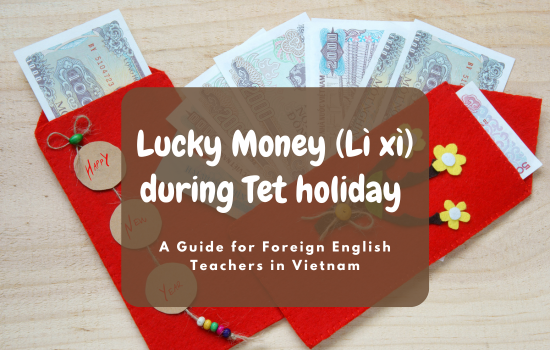Lucky Money (Li Xi) During Tet: A Guide for Foreign English Teachers in Vietnam
Tet, the Vietnamese Lunar New Year, is a time of vibrant celebrations, family gatherings, and cherished traditions. One of the most prominent customs during Tet is the exchange of "lucky money" (or "li xi" in Vietnamese), a tradition deeply rooted in Vietnamese culture. This guide will delve into the significance of lucky money during Tet, particularly focusing on its meaning for children and elders, and offer practical tips for foreign English teachers navigating this cultural aspect.
The Significance of Lucky Money (Li Xi) During Tet
Li xi, typically presented in red envelopes, symbolizes good luck, prosperity, and blessings for the recipient. During Tet, it's customary for elders, such as grandparents, parents, and older relatives, to give li xi to younger generations, including children, unmarried adults, and even newlyweds.
For Children:
- A Symbol of Good Fortune: Receiving "li xi" during Tet is a highly anticipated event for Vietnamese children. It signifies good fortune, prosperity, and a successful year ahead.
- A Learning Experience: The act of receiving li xi teaches children about respect for elders and the importance of family traditions.
- A Source of Motivation: "Li xi" can also serve as a source of motivation for children to study hard and achieve their goals.
For Elders:
- A Gesture of Love and Blessings: Giving "li xi" to younger generations is a way for elders to express their love, affection, and blessings for their well-being and future success.
- Upholding Tradition: The act of giving "li xi" helps to preserve and perpetuate this cherished Vietnamese tradition for future generations.
Li Xi for Foreign English Teachers During Tet
As a foreign English teacher in Vietnam, you may find yourself in situations where you are expected to participate in Tet celebrations, including the exchange of "li xi". Here's how to approach this:
- Understanding Student Expectations: Vietnamese students often expect to receive "li xi" from their teachers on the first day of school after the Tet holiday.
- The Importance of Gestures: While the amount of money is not the primary focus, a small gesture of appreciation is highly valued. Consider giving each student a small gift, such as a candy, a small toy, or a new bill of small denomination (like 10,000 or 20,000 VND) in a red envelope. Remember to use new bills for lucky money.
- Respectful Presentation: When giving "li xi", present it with both hands and a warm smile. A simple "Chúc mừng năm mới" (Happy New Year) or "Chúc bạn học giỏi" (Wishing you academic success) will be greatly appreciated.
Conclusion
The exchange of "li xi" is a deeply meaningful and cherished tradition during Tet in Vietnam. By understanding its significance and approaching it with respect and cultural sensitivity, foreign English teachers can enhance their relationships with their students and enrich their overall experience in Vietnam.


